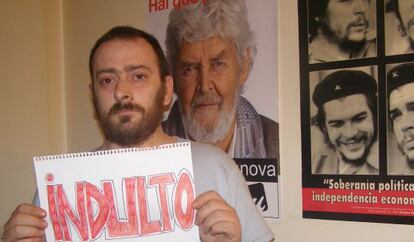No pardon for former drug addict who now does charity work
Galicia man must serve seven years for selling heroin sachet, says government

What do a Banco Santander chief executive and four Catalan Mossos d’Esquadra police officers found guilty of torturing a suspect have in common? Both are considered worthy of a judicial pardon by the government, a measure it is able to apply whenever it feels like without having to give any reason.
The government has not, however, felt the need to grant any mercy to David Reboredo, a 43-year-old from Vigo sentenced to seven years in prison for dealing a few sachets of heroin — 0.2 grams of pure and 0.4 grams of the cut substance — in 2006 and 2009. After 20 years of drug addiction, he has been clean for the past two and has a number of local associations vouching for his re-entry into society. But it has not been enough, and on Wednesday he was sent to jail in Galicia.
The day before it was a weary, growly voiced Reboredo who answered his phone. “I have just come back from collecting the papers at the court. Tomorrow (Wednesday) before seven o’clock I have to report at A Lamna,” he says, before recounting his story. “At 16, at the Calvario high school, I started messing around, joints. It was the 1980s and the heroin boom... I was in a hole for many years and just when I saw myself looking good... As you can see.”
In his dark years, he racked up some petty theft charges paying for his addiction. His first charge for selling a sachet got him a three-and-a-half year sentence, but he managed to get it suspended. He promised not to reoffend and to follow a treatment program, but succumbed once again. It was just once, in 2009, and for exactly the same crime as before. The sentence was the same, but as he was on probation, the second penalty was added to the first. He appealed to the Supreme Court, but with no luck.
At that point he played his last card in the hope of receiving a pardon. His lawyer, Guillermo Presa, obtained some pardons under the Socialist government, always in similar cases of rehabilitated drug addicts who find themselves trapped by their previous mistakes when they see a way out. “It happens frequently, justice works slowly and catches them in another life situation,” Presa explains.
The no from the government arrived on November 5, barely two weeks before it pardoned four Catalan regional police officers sentenced to jail terms for torturing a suspect. “It’s blatant, it proves it is a political matter; it’s used whenever they fancy and according to the ideology of the government in power. It has nothing to do with the initial idea, that of compensating for the disproportion of laws,” says Presa.
He tried to get one of the provisos of the 2010 legal reform, which stipulates the reduction of sentences in cases such as his, applied to Reboredo, but without success.
A number of organizations, including Médicos del Mundo and Érguete, have tried to vouch for Reboredo’s rehabilitation. “I work with the Imán support group for HIV positive people, as well as in therapy sessions for Cedro (Vigo city council’s drug addiction assistance unit).”
Tu suscripción se está usando en otro dispositivo
¿Quieres añadir otro usuario a tu suscripción?
Si continúas leyendo en este dispositivo, no se podrá leer en el otro.
FlechaTu suscripción se está usando en otro dispositivo y solo puedes acceder a EL PAÍS desde un dispositivo a la vez.
Si quieres compartir tu cuenta, cambia tu suscripción a la modalidad Premium, así podrás añadir otro usuario. Cada uno accederá con su propia cuenta de email, lo que os permitirá personalizar vuestra experiencia en EL PAÍS.
¿Tienes una suscripción de empresa? Accede aquí para contratar más cuentas.
En el caso de no saber quién está usando tu cuenta, te recomendamos cambiar tu contraseña aquí.
Si decides continuar compartiendo tu cuenta, este mensaje se mostrará en tu dispositivo y en el de la otra persona que está usando tu cuenta de forma indefinida, afectando a tu experiencia de lectura. Puedes consultar aquí los términos y condiciones de la suscripción digital.








































